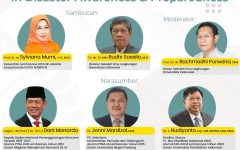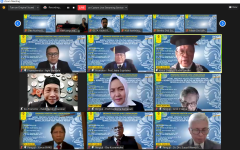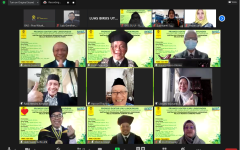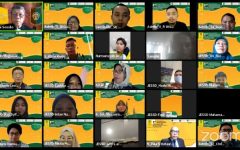Supporting the Achievement of Depok Smart City Concept, SIL UI Organizes Workshop on Dissemination of MoL Compost Technology (Local Microorganisms)
August 9, 2023 2024-12-21 17:17Supporting the Achievement of Depok Smart City Concept, SIL UI Organizes Workshop on Dissemination of MoL Compost Technology (Local Microorganisms)

Supporting the Achievement of Depok Smart City Concept, SIL UI Organizes Workshop on Dissemination of MoL Compost Technology (Local Microorganisms)

Depok – The School of Environmental Science of the University of Indonesia (SIL UI) together with the Depok City Government initiated a movement to care for household waste through a Community Service Program entitled “MoL (Local Microorganisms) Compost Technology Dissemination Workshop” on November 5-19, 2022 in Cinangka, Depok City.
This activity was motivated by several problems in Depok City related to waste management to support the Smart City concept, which is a city that manages all the potential of natural and human resources effectively and efficiently to meet various needs and solve various sustainability challenges through the integration of sustainable innovation management.
The event was opened with remarks from Ir. H. Imam Budi Hartono, as Deputy Mayor of Depok City, and Dr. Sri Setiawati Tumuyu, M.A., as the head of the community service coordinator, MoL compost technology activist, and the National P2WKSS assessment team.

The event then continued with the provision of material and training to the participants, attended by 21 women of the Srikaya Women Farmers Group (KWT) in RW 04, Cinangka Village, which is the location of P2WKSS (Women’s Role Improvement Program Towards Healthy and Prosperous Families) Depok City.
The training and mentoring was not only carried out by Lecturers and Students of the University of Indonesia Master of Environmental Science Program, but also several other alumni.

In this regard, Aryani, as an alumnus of the Master of Environmental Science Program, stated that she was very happy to be able to participate in sharing knowledge in her thesis study to support the development of the P2WKSS location in Depok City and the achievement of the Depok Smart City concept.
“It’s great if our knowledge can be shared and applied in a real way for the development of the environment and society, especially here they also have a gardening program, so it is very suitable to support their gardening activities,” said Aryani.

This program was initiated by Dr. Hayati Sari Hasibuan, S.T., M.T. and Dr. Sri Setiawati Tumuyu, M.A., as permanent lecturers at the School of Environmental Sciences, University of Indonesia (SIL UI). They consider that the application and development of MoL compost technology can be one of the solutions that can bring many benefits in a sustainable manner.
“The application and development of MoL technology not only reduces the volume of waste generation which has an impact on the quality of bio-physical environmental health, but can also support the achievement of the circular economy concept and the independence of food source production for food security indirectly,” said Hayati.
In line with that, Dr. Sri Setiawati Tumuyu, M.A. also emphasized that the method of making Mo Lini fertilizer is easy with materials that are easily available and cheap.
“The basic ingredient for making MoL is rice or bread that has expired or is not suitable for consumption. Processing MoL is not difficult. Rice or bread is placed in a baskets and then allowed to stand for 7-14 days in a dark and closed place and 3 tbsp of sugar and rice washing water waste that can be processed to help the fermentation process in this MoL,” Sri said.
He also explained that this color change is due to the presence of decomposing microorganisms, namely Tricoderma sp. The use of microorganisms as decomposers makes this compost called MoL compost. In this case, 1 liter of MoL liquid can produce 10 liters of fertilizer liquid.

This activity is expected to provide benefits for local residents to enjoy lush, green, and beautiful plants at an affordable cost.
Moreover, it can also support the creation of the Depok Smart City concept through the implementation of the Smart Society pillar supported by Smart Governance to create a Smart Environment for the creation of Smart Living and Smart Economy with the ultimate goal of Smart Branding.
In the context of waste problems, the meaning of achieving the Smart Society pillar is to improve the mentality of the community as a source of waste generation, related to the patterns and lifestyles that develop.







